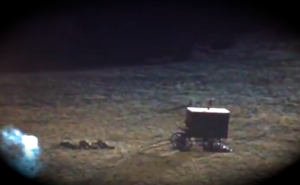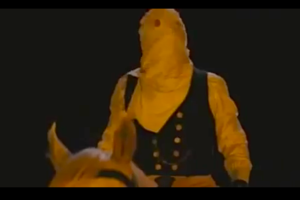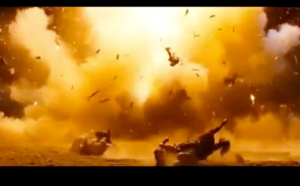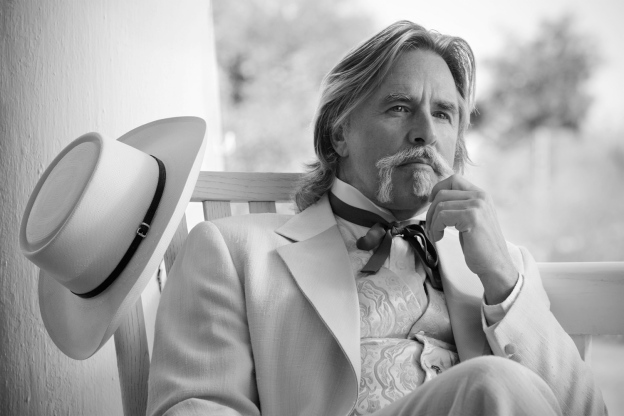Question: Why are their hoods pointed?
Answer: It’s easier to fit over the dunce cap.
Boys, let us get up a club. With those words, six restless young men raided the linens at a friend’s mansion, pulled pillowcases over their heads, hopped on horses, and cavorted through the streets of Pulaski, Tennessee. The six friends named their club the Ku Klux Klan, and, all too quickly, their club grew into the self-proclaimed Invisible Empire with secret dens spread across the South. –They call themselves the K.K.K.: The birth of an American terrorist group, Susan Campbell Bartoletti
Enter a scene through Spencer Bennett’s perspective. Two men lay innocently sleeping on the ground accompanied by three lifeless bodies, soon to be five
[1]Bennett and his two companions gallop down a hill to their contraband of twenty-seven horsemen, all donning saggy white flour bags with uneven holes cut in the front. This tribe of men plans on raiding a bounty hunter and “a killer nigger over that hill” in order to “make a lesson out of him” and prove that neither “nigger lover” nor a black man has the right to kill a white man on any of their plantations and get away with it.
What Mr. Bennett, known as “Big Daddy” by his inferiors, does not understand is that not only is his flour sack a sorry excuse for a disguise, but also that his clan of men holds no form of intimidation or strong leadership. In the beginning of the scene Mr. Bennett believes he has power over the situation, so much power that he confidently states, “We’re gonna whip that nigger lover to death. And I’m gonna personally, strip and clip that garboon myself.” Mr. Bennett takes control of the situation and lays out the torturing instructions, allowing his crew to whip the nigger lover as much as they want, just as long as he can have his way with Django, the alleged “garboon.”
Mr. Bennett’s choice of torture for Django is fascinating because he does not plan on solely killing the black freeman, he wants to make him the least bit of a man that he possibly can. By “stripping and clipping” Django, Mr. Bennett would be taking away the only means for Django to continue his black bloodlines and shaving him of all his dignity, making him naked to the world. These words are some of his first lines in the scene, proving to viewers that he finds it repulsive for any black man to reproduce and that he is disgusted by a black man’s sexuality. Shaving and cutting off Django’s nads would be the best way to destroy Django’s ego, in Mr. Bennett’s eyes, and would ensure that Django is emotionally destroyed prior to his physical demise.
A person watching this scene has a difficult time believing that Mr. Bennett’s group of men will actually do damage to Django or Dr. Schultz; once Mr. Bennett puts on his mask and confusedly looks around like a lost child, all forms of terrorization are lost. Mr. Bennett’s confusion with his mask proves that he not as powerful of a character as he believes himself to be and that he is blinded easily by simple objects. Bennett is somewhat intimidating when he is planning on de-manning Django, and Tarantino proves Mr. Bennett’s power by placing the camera so it is lower than Mr. Bennett, making it seem as if his cohorts and the viewers are looking up to him. By lowering the camera angle at the beginning of the scene, Tarantino is portraying Mr. Bennett’s supremacy by making him seem larger than the rest of his company. Throughout the scene Tarantino slowly backs the camera away from Mr. Bennett, making him seem farther away and less intimidatingly large, proving that his intimidation is only a visage. [2]
“Damn, I can’t see fuckin’ shit outta this thing.” The charmingly spoken words associated with Mr. Bennett’s demise. By admitting that he cannot “see shit” Mr. Bennett is acknowledging to his cohorts that he actually does not know what he is doing at all. He is blinding himself with so much hatred towards black men that he is obscuring his vision of the world. This section of the scene is a time when Tarantino really starts to use a play-on-words to parallel what will happen with the men later on in the scene. Tarantino’s perspective is coming into play and he really begins to control the viewer’s beliefs with the phrases he gives the masked horsemen.
One of the masked horsemen makes a valiant attempt to continue the raid, but Mr. Bennett distracts the proto clan by ripping his eyeholes, admitting that he made his dilemma worse rather than better. Ripping the eyeholes is a pivotal part to this scene because once Mr. Bennett tries to fix his disguise and fails at such a simple task, his fellow farmers are on an equal level as he; a sign by Tarantino indicating that Mr. Bennett’s vision of this great raid and where he stands in power with these men is even more obscured than he thought. The eyeholes ripping cause the men to question Mr. Bennett’s actions, shadowing that they do not trust him anymore. The eyeholes are a central part to this scene because they are equivalent to the men’s minds. One of the riders makes a very valid point when he explains, “when I start ridin’ the bag starts movin’ all over, and I’m riding blind.” This statement has a direct correlation with what the riders are doing; they are riding down a hill into a trap because they are unable to see the danger ahead.  [3]Tarantino is also using the eyeholes as a reference to how the riders are ethically blind when it comes to race. Even though Django is a freed man, the proto clan sees his existence as sub-par to theirs solely based on the color of his skin.
[3]Tarantino is also using the eyeholes as a reference to how the riders are ethically blind when it comes to race. Even though Django is a freed man, the proto clan sees his existence as sub-par to theirs solely based on the color of his skin.
How Tarantino decided to come up with this scene has its own story. Of course there are many parts in a person’s life that influence thoughts and feelings, but in an interview with The Root webpage, Tarantino reflects on why he chose to create this scene, “I’m obsessed with The Birth of a Nation and its making. I think it gave rebirth to the Klan and all the blood that that was spilled throughout.” By basing this mock KKK scene on The Birth of the Nation, with his own twist Tarantino was able to create his own rebirth to the Ku Klux Klan.
The Birth of a Nation is a silent movie created in 1915 about two families during the Civil War and reconstruction era of America, the northern Stonemans and the southern Camerons. This film is noted to have caused the second rising of the Ku Klux Klan in Stone Mountain, Georgia. While the film is not centered on the KKK, there are certain story elements that relate to the KKK and protecting white power that are crucial to the story. The Birth of a Nation hints that the KKK thought of their idea to wear white after observing children pretending to be ghosts dressed in white sheets in order to scare off the black children (Stokes, 1).
Tarantino is known for his lack of historical accuracy, and it is almost as if he based this scene on all of the stereotypes of the Ku Klux Klan. There are, however, certain elements of the scene that Tarantino used in order to have the viewers make a connection between the satirical KKK and the actual KKK. The creation of the Ku Klux Klan was indeed in Tennessee, as Tarantino hinted in his version, but nowhere near Gatlinburg, the city where the mock KKK scene took place; the Ku Klux Klan was first established in Pulaski, Tennessee in 1866.
Many of the founding members were former Confederate soldiers who did not agree with the Republican Party’s stance on reconstruction of the South – to eliminate certain causes of the Civil war, such as southern states succeeding and the constitutional status of African-Americans. The sole purpose of the Ku Klux Klan was not to kill black men as Tarantino made obvious in his version; the basis of the clan was to promote white supremacy. Violence occurred throughout the KKK’s creation in order to stop black men from being voted into legislation (Wade, 2).
Looking at Mr. Bennett’s cohorts from Tarantino’s angle, it is obvious that the director wants people to view this scene as a complete mockery of the creation of the Ku Klux Klan. Tarantino controls the audience and not only makes viewers believe that all of these men are idiotic, but also emphasizes his feelings about the group by involving them in one of the most comedic scenes of the movie. He creates the story of how the Ku Klux Klan was formed into a satire, making a somewhat convincing argument of how these not so powerful farmers got together to form this extremely powerful club. The irony of Tarantino’s side is not lost because it takes great leadership to form an influencing association like the Ku Klux Klan, yet these farmers cannot even lead their own horses. Tarantino causes a person looking back on the KKK to wonder how a group of racist farmers could be so intimidating when they are so comedic on film.
Works cited
1.) Stokes, Melvyn. D.W. Griffith’s The Birth of a Nation: A History of “the Most Controversial Motion Picture of All Time” New York: Oxford UP, 2007. Print.
2.) Wade, Wyn Craig. The Fiery Cross: The Ku Klux Klan in America. New York: Simon and Schuster, 1987. Print.
[1] Mr. Bennett’s perspective of Django and Dr. Schultz sleeping. Fun fact: this scene almost was taken out of the film.
[2] At this point in the scene Mr. Bennett begins to be blinded by his eyeholes, a parallel Tarantino uses to prove that his beliefs blind him from seeing the world.
[3] A screenshot of the chaotic demise of the proto-clan after they rode blind into a trap set up by Dr. Schultz.

